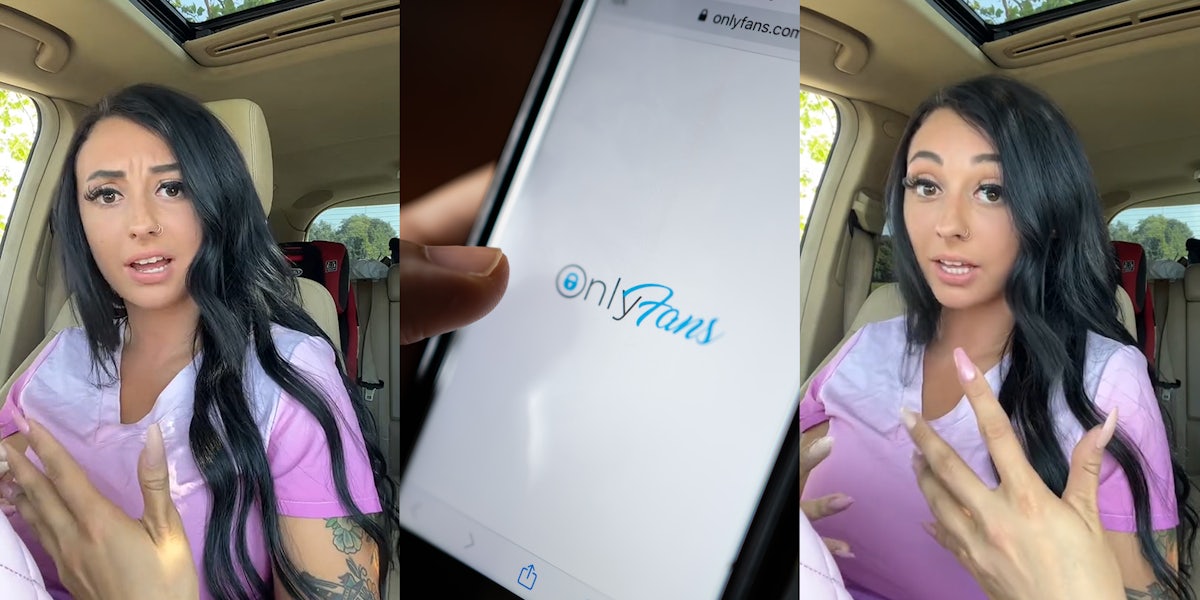Exclusive Leak: Shark.Bae's OnlyFans Content Exposed
What is "shark.bae leaked onlyfans"?
"Shark.bae leaked onlyfans" refers to the unauthorized release of private and sexually explicit content from the OnlyFans account of a user known as "shark.bae."
The leak, which occurred in [Date], has raised concerns about the privacy and security of user data on OnlyFans. It has also sparked a debate about the ethics of sharing non-consensually leaked content.
OnlyFans is a subscription-based platform that allows users to share exclusive content with their subscribers. Users can charge a monthly fee for access to their content, which can include photos, videos, and live streams. OnlyFans has become increasingly popular in recent years, with users ranging from celebrities and influencers to everyday people.
The "shark.bae leaked onlyfans" incident is a reminder of the importance of protecting one's privacy online. It is also a reminder that sharing non-consensually leaked content is a serious violation of someone's privacy.
shark.bae leaked onlyfans
The "shark.bae leaked onlyfans" incident has raised important questions about privacy, consent, and the ethics of sharing non-consensually leaked content. Here are seven key aspects to consider:
- Privacy: The leak of "shark.bae leaked onlyfans" content violated the privacy of the individual who created it.
- Consent: The content was shared without the consent of the individual who created it.
- Ethics: Sharing non-consensually leaked content is a serious violation of someone's privacy.
- Security: The leak raises concerns about the security of user data on OnlyFans.
- Impact: The leak has had a significant impact on the individual whose content was leaked.
- Legal: Sharing non-consensually leaked content may be illegal in some jurisdictions.
- Social: The leak has sparked a debate about the ethics of sharing non-consensually leaked content.
These seven aspects are all important to consider when thinking about the "shark.bae leaked onlyfans" incident. The leak was a violation of privacy, and it raises important questions about the ethics of sharing non-consensually leaked content. It is important to remember that sharing non-consensually leaked content is a serious violation of someone's privacy.
Privacy
The leak of "shark.bae leaked onlyfans" content violated the privacy of the individual who created it because it was shared without their consent. The individual had a reasonable expectation of privacy in their OnlyFans content, and the leak of this content violated that privacy.
The leak of "shark.bae leaked onlyfans" content is a serious violation of privacy because it can have a significant impact on the individual whose content was leaked. The leak can lead to the individual being harassed, stalked, or even blackmailed. It can also damage the individual's reputation and make it difficult for them to get a job or maintain relationships.
It is important to remember that sharing non-consensually leaked content is a serious violation of someone's privacy. If you come across non-consensually leaked content, do not share it. Instead, report it to the platform where you found it.
Consent
The connection between "Consent: The content was shared without the consent of the individual who created it." and "shark.bae leaked onlyfans" is clear: the leak violated the individual's right to privacy and consent.
When someone creates content for OnlyFans, they have a reasonable expectation that their content will remain private. They have the right to control who sees their content and how it is used. When someone leaks content without the creator's consent, they are violating that right.
In the case of "shark.bae leaked onlyfans," the leak had a significant impact on the individual whose content was leaked. The individual was harassed and bullied online, and their reputation was damaged. The leak also made it difficult for the individual to get a job.
The importance of consent cannot be overstated. When we share content without someone's consent, we are violating their privacy and putting them at risk. It is important to always ask for consent before sharing someone's content.
If you come across non-consensually leaked content, do not share it. Instead, report it to the platform where you found it.
Ethics
The connection between "Ethics: Sharing non-consensually leaked content is a serious violation of someone's privacy." and "shark.bae leaked onlyfans" is clear: the leak violated the individual's right to privacy and consent. When someone leaks content without the creator's consent, they are violating that right.
In the case of "shark.bae leaked onlyfans," the leak had a significant impact on the individual whose content was leaked. The individual was harassed and bullied online, and their reputation was damaged. The leak also made it difficult for the individual to get a job.
The importance of ethics cannot be overstated. When we share content without someone's consent, we are violating their privacy and putting them at risk. It is important to always ask for consent before sharing someone's content.
If you come across non-consensually leaked content, do not share it. Instead, report it to the platform where you found it.
Security
The "shark.bae leaked onlyfans" incident has raised concerns about the security of user data on OnlyFans. The leak suggests that user data on OnlyFans may not be as secure as users thought. This is a serious concern, as OnlyFans users often share sensitive personal information, such as their credit card numbers and home addresses.
- Encryption: OnlyFans uses encryption to protect user data. However, the leak suggests that this encryption may not be strong enough to protect user data from hackers.
- Data storage: OnlyFans stores user data on its own servers. This means that OnlyFans is responsible for protecting user data from hackers. However, the leak suggests that OnlyFans may not be doing enough to protect user data.
- Third-party access: OnlyFans allows third-party apps to access user data. This means that user data may be shared with companies that OnlyFans does not control. This raises concerns about the security of user data.
- User behavior: Users can take steps to protect their own data on OnlyFans. For example, users can use strong passwords and two-factor authentication. However, the leak suggests that many users are not taking these steps.
The "shark.bae leaked onlyfans" incident is a wake-up call for OnlyFans. The company needs to take steps to improve the security of user data. OnlyFans users also need to take steps to protect their own data.
Impact
The "shark.bae leaked onlyfans" leak has had a significant impact on the individual whose content was leaked. The individual has been harassed and bullied online, and their reputation has been damaged. The leak has also made it difficult for the individual to get a job.
The impact of the leak is a reminder that non-consensually leaked content can have a devastating impact on the individual whose content was leaked. It is important to remember that sharing non-consensually leaked content is a serious violation of someone's privacy.
If you come across non-consensually leaked content, do not share it. Instead, report it to the platform where you found it.
Legal
The connection between "Legal: Sharing non-consensually leaked content may be illegal in some jurisdictions." and "shark.bae leaked onlyfans" is clear: the leak violated the individual's right to privacy and consent. When someone leaks content without the creator's consent, they may be breaking the law.
- Copyright law: Copyright law protects the original works of authorship, including photographs and videos. Sharing non-consensually leaked content may violate the copyright holder's exclusive rights to reproduce, distribute, and display their work.
- Privacy law: Privacy law protects individuals from having their personal information shared without their consent. Sharing non-consensually leaked content may violate the individual's right to privacy.
- Criminal law: In some jurisdictions, sharing non-consensually leaked content may be a crime. For example, in California, it is a crime to distribute an intimate image of someone without their consent.
The legal consequences of sharing non-consensually leaked content can be severe. Individuals who share non-consensually leaked content may be subject to civil lawsuits, criminal prosecution, and other penalties.
Social
The "shark.bae leaked onlyfans" incident has sparked a debate about the ethics of sharing non-consensually leaked content. This debate is important because it raises awareness of the privacy and consent issues surrounding non-consensually leaked content.
Non-consensually leaked content is a serious violation of privacy. When someone shares non-consensually leaked content, they are violating the privacy of the individual whose content was leaked. This can have a devastating impact on the individual, including harassment, bullying, and damage to their reputation.
The "shark.bae leaked onlyfans" incident is a reminder that non-consensually leaked content is a serious problem. It is important to remember that sharing non-consensually leaked content is never okay. If you come across non-consensually leaked content, do not share it. Instead, report it to the platform where you found it.
The debate about the ethics of sharing non-consensually leaked content is an important one. It is a reminder that we need to protect the privacy of individuals and that sharing non-consensually leaked content is never okay.
FAQs about "shark.bae leaked onlyfans"
This section provides answers to frequently asked questions about the "shark.bae leaked onlyfans" incident. These questions address common concerns and misconceptions about the leak and its implications.
Question 1: What is "shark.bae leaked onlyfans"?
Answer: "Shark.bae leaked onlyfans" refers to the unauthorized release of private and sexually explicit content from the OnlyFans account of a user known as "shark.bae."
Question 2: Why is the "shark.bae leaked onlyfans" incident significant?
Answer: The leak is significant because it raises concerns about the privacy and security of user data on OnlyFans. It also highlights the importance of consent in sharing sexually explicit content.
Question 3: What are the legal implications of sharing non-consensually leaked content?
Answer: Sharing non-consensually leaked content may violate copyright law, privacy law, and criminal law. Individuals who share such content may be subject to civil lawsuits, criminal prosecution, and other penalties.
Question 4: What should I do if I come across non-consensually leaked content?
Answer: If you come across non-consensually leaked content, do not share it. Instead, report it to the platform where you found it.
Question 5: What steps is OnlyFans taking to address the "shark.bae leaked onlyfans" incident?
Answer: OnlyFans has taken several steps to address the leak, including increasing security measures, providing support to affected users, and cooperating with law enforcement.
Question 6: What lessons can we learn from the "shark.bae leaked onlyfans" incident?
Answer: The leak is a reminder that we need to protect our privacy online and that we should never share sexually explicit content without the consent of the individual depicted.
Summary: The "shark.bae leaked onlyfans" incident is a serious reminder of the importance of privacy, consent, and online safety. It is important to be aware of the risks of sharing non-consensually leaked content and to take steps to protect ourselves and others from such violations.
Next: The impact of the "shark.bae leaked onlyfans" incident on the adult entertainment industry
Conclusion
The "shark.bae leaked onlyfans" incident is a serious reminder of the importance of privacy, consent, and online safety. The leak highlights the risks of sharing non-consensually leaked content and the devastating impact it can have on the individual whose content was leaked.
It is important to remember that sharing non-consensually leaked content is never okay. If you come across such content, do not share it. Instead, report it to the platform where you found it. We all have a responsibility to protect our privacy and the privacy of others.

What Is Shark Bae Real Name? Wikipedia And Age

OnlyFans Creator Says She Was Fired From Nursing Job